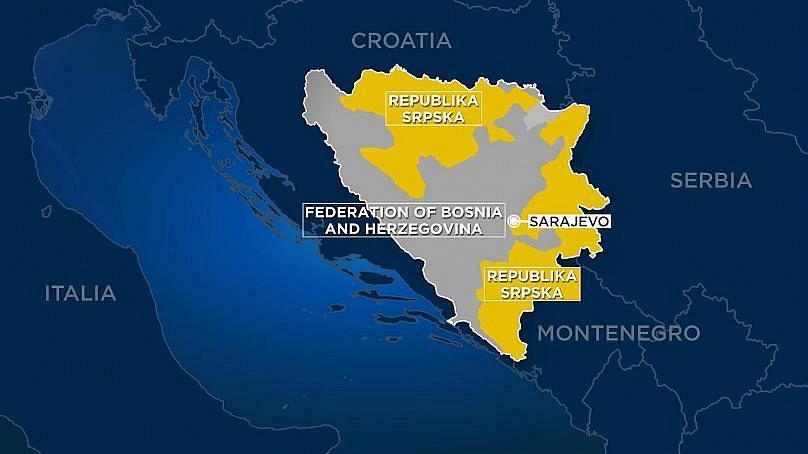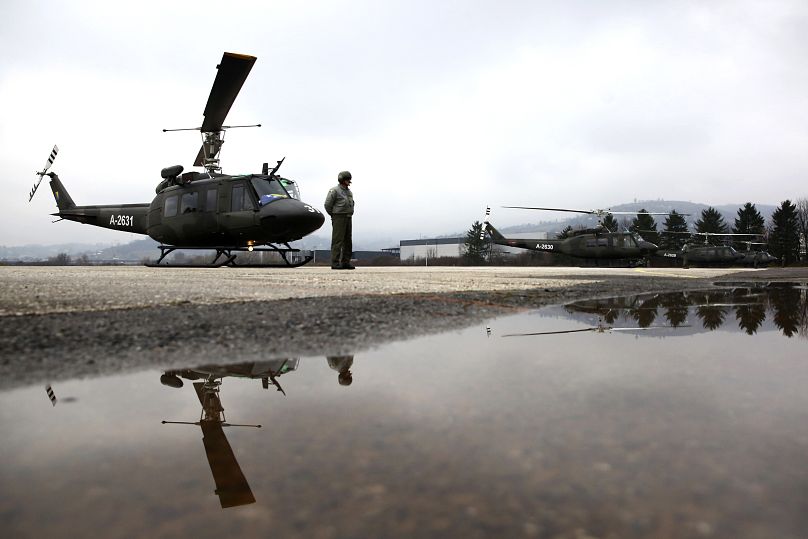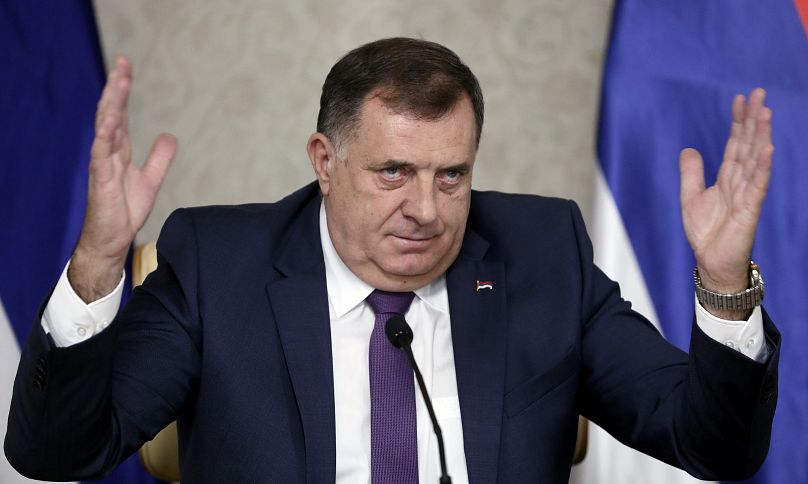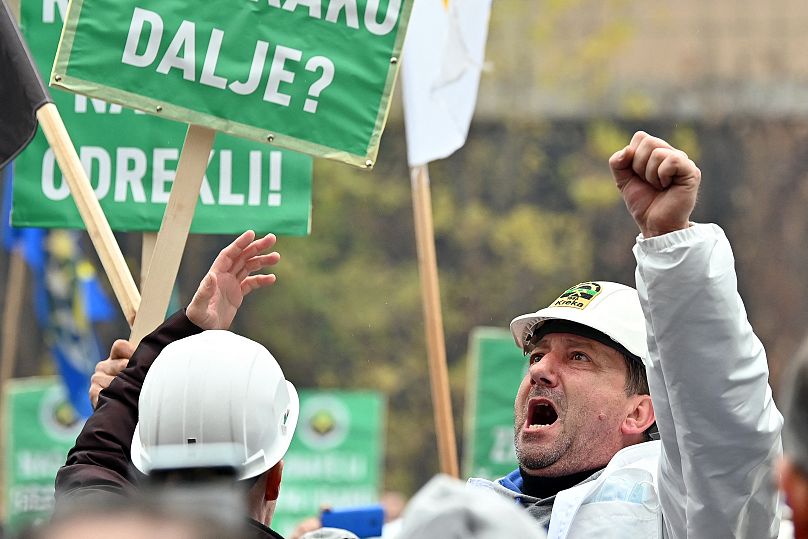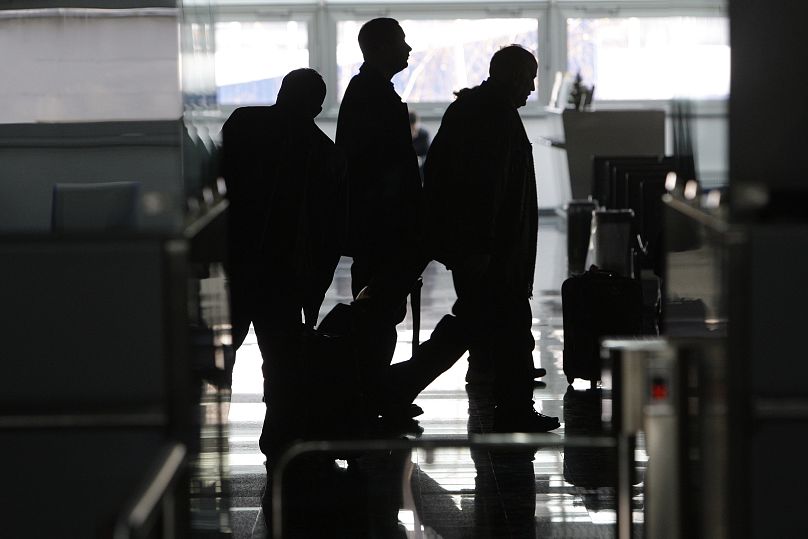Milorad Dodik's most recent attempts to weaken Bosnia's state-level institutions in the country have led to the most significant political crisis since the 1992-1995 war.
One of Bosnia and Herzegovina’s three presidents, Milorad Dodik, spent the last three months pushing for laws that would see almost half of the country withdraw from its central institutions.
The nationalist Bosnian Serb leader is clearly aiming to weaken the country’s central government, including threats of creating his own Bosnian Serb army.
For many, this is eerily similar to the scenario that launched the 1992-1995 Bosnian War and has provoked fears of a renewed conflict in the country.
“Fear is a category that’s difficult to both define and contain,” Benjamin Butković, a Sarajevo-based journalist, told Euronews.
“But the fear of conflict, be it minor or major, has been present since the Dayton Peace Accords were signed,” he said.
Bosnia’s recent history was marked by a bloody war that saw 100,000 casualties, with two million people becoming either refugees or internally displaced in a country of 3.5 million.
Drafted to bring the war to an end in 1995, the US-sponsored Dayton Peace Accords created two main administrative units in Bosnia — the Serb-dominated entity of Republika Srpska, or RS, and the Bosniak-Croat majority Federation of BiH.
The two entities were given some autonomy, with an umbrella state-level government with its three-way presidency — with each member representing one of the three main ethnic groups — and a council of ministers overseeing the country's main institutions, including the army, the top judiciary, and tax administration.
It is precisely these institutions that Dodik wants to pull out of.
The peace agreement also created one of the most complicated political systems in the world, with a dizzying maze of jurisdictions enabling the country’s three main ethnic groups to dominate domestic politics and exert control over key decision-making processes.
The logic was, if the main three sides in the conflict shared power equally, then future conflicts would be evaded.
Dodik, a hard-line populist, widely considered to be one of the most nationalist politicians in the region, has toyed with the threat of secession in the past.
Yet the current crisis marks his most significant attempt at furthering his goals to date. The peace deal that doubles as the country’s constitution could either combust or finally be changed for the better.
According to Butković, the peace agreement was primarily designed to end the hostilities. Give everyone what they want, and no one is angry. Yet it never allowed the country to progress further and has since trapped it in a constant ebb-and-flow of crises and appeasement.
“The state of crisis has been continuous in Bosnia, and it quietens down or escalates with each passing year,“ Butković said.
“How to resolve it is a million-dollar question. And nothing is being done to get rid of the cause because each year we are simply trying to fix the consequences,” he explained.
Genocide denial law leads to mutiny
One of the quirks of Bosnia’s system is that it effectively has an international governor or peace envoy, whose main duty is to monitor the implementation of the Dayton Peace Agreement and intervene where the country’s institutions cannot due to deadlock.
Officially an international civilian mediator, the High Representative maintains order by adopting laws when domestic politicians are unable or unwilling to, or remove politicians considered destructive to Bosnia’s system.
In July, the former High Representative Valentin Inzko invoked his executive powers to unilaterally pass the nation's first law prohibiting genocide denial.
During the war, the Bosnian Serb army was responsible for a bloody campaign of war crimes and ethnic cleansing chiefly directed against Bosniaks for their nominal Muslim faith, culminating in the summary executions of over 8,000 mostly men and boys in Srebrenica in July 1995.
The International Criminal Tribunal for the former Yugoslavia, or ICTY, has deemed Srebrenica a genocide. Several genocide convictions were made against the Bosnian Serb military and political leadership for the massacre – considered the worst atrocity on European soil since World War II.
This is why Dodik’s attempt to withdraw from the state armed forces and recreate a Bosnian Serb military is seen as particularly problematic due to its wartime history.
Dodik adamantly refuses to recognise the genocide in Srebrenica and has openly supported figures who deny it and encourage revisionism.
He sees the law against genocide denial as being imposed. Soon after it was announced, he pushed a law through the RS assembly – one of Bosnia’s regional parliaments – voiding the law. While the RS assembly can not void a state law, it is a way for him to purport he has public support for his initiative.
At the same time, Dodik demanded that all Bosnian Serb representatives boycott the work of the state-level institutions.
Then last Friday, the RS assembly MPs voted yes on a set of provisions that would see the regional government opt-out of several national institutions.
The adopted measures come with a six-month period needed to draft the new laws, including changes to the entity's constitution.
Sanctions and criminal proceedings
In recent months, both the US and the European Union have sent diplomats to Bosnia to try and dissuade Dodik and re-establish functioning institutions. Condemnations of Dodik’s initiatives from Washington and some in Brussels also came with threats of possible sanctions against him.
But while the international community is debating the possibility of sanctioning Dodik and other Bosnian Serb politicians if the crisis persists, he does not seem to fear any form of repercussions for his actions.
He responded to the recent threats of sanctions by German officials by stating he “wasn’t elected by German people, but rather [his] own.”
“I haven’t been to Germany in five years, so I don’t have to go now either,” he commented at a press conference on Wednesday when asked about a possible travel ban against him.
Domestically, the most recent legal complaint against Dodik was filed with the state-level Prosector’s Office on Tuesday.
Bosnian NGO Žene žrtve rata (“Women Victims of War”) and the Institute for Research of Genocide Canada filed a joint charge against Dodik for “undermining the constitutional order and jeopardising the country’s territorial integrity” as well as mutiny and the illegal formation of military forces, among other claims.
This is not the first time Dodik’s actions were contrary to Bosnian laws — in fact, it is just one of several complaints filed against him in 2021.
Earlier this year, an official investigation was opened by the state prosecution after the Ukrainian Ministry of Foreign Affairs claimed that a lavish Orthodox Christian icon gilded in gold that Dodik gifted to Russia’s foreign affairs chief Sergey Lavrov was in fact stolen during the ongoing war in Donbas.
After the genocide denial law came into force, Dodik’s name found itself on a list of 29 persons accused of the crime, pending an investigation by the state prosecution.
The complaint came after he told Serbian tabloid Srpski Telegraf that “there is only one truth, there was no genocide [in Srebrenica]” on August 12.
He confirmed he was subpoenaed on August 19.
“Everybody has the right [to file complaints]. I think I’m the person with the most criminal charges. I keep getting something every day,” he commented at a press conference.
Since the subpoena, Dodik repeatedly refused to come in for questioning, while publicly promising police protection for those who live in the RS if they get accused of genocide denial charges – an attempt to deflect from his own responsibility.
“Dodik has had a number of complaints against him over the years — from corruption to the abuse of power, exerting pressure on voters, public threats, wiretapping the opposition and others,” Ivana Korajlić, the executive director of Transparency International BiH told Euronews.
“But that has never led to anything, and the main reason is his influence on the judiciary in Bosnia,” she said.
While the state judiciary should be the one owning the cases, the fact it shies away from prosecuting the likes of Dodik indicates the dire situation it finds itself in, Korajlić believes.
“If you don’t have a judiciary that is ready to react to any kind of illegal behaviour, this can lead to catastrophic consequences. And then you can’t expect to be saved by the international community – or anyone else for that matter.”
The key aspects of the system, such as the way in which prosecutors and judges are appointed, or the fact that charges are being brought up “selectively, in order to discredit those not favoured by the ruling class” points to constant influence trading, according to her.
“It’s tragic that [the judges and prosecutors] work for those who appointed them, and not for the citizens of Bosnia,” Korajlić told Euronews.
And Milorad Dodik is using the system to his advantage.
Although his initiative to create entity-level institutions might not pass the existing checks and balances and will likely be blocked by either the upper house of the entity-level parliament or the state Constitutional Court — the question of the legality of his actions is not his primary concern, Korajlić believes.
“We’ve seen similar blackmail from him for the past 15 years, which served the purpose of achieving his personal and political goals and strengthening his hand in negotiations.”
“This time around, the question is how far he is ready to go and what his end goal might be,” Korajlić concluded.
When asked about the aforementioned charges against Dodik, the state Prosecutor’s Office told Euronews that the complaints “are being processed by the assigned prosecutors, and are in different stages of procedure”.
“The public will be duly notified about prosecutorial decisions in each of the cases,” the statement said.
Crisis spurs people’s desire to leave
But the country is not only mired in political discord. In November, miners from seven coal mines protested in Sarajevo for several days after a new collective agreement threatened to cut their already meagre pay in half.
“We are for the country of Bosnia and Herzegovina — what about you?” read one of the banners seen at the protests.
On Wednesday, in Konjic, medical workers took off their white coats to protest the fact that they have not been paid since August.
Some of the protesters told the local N1 TV station that the miserable working conditions – especially in the midst of a pandemic — have forced many to consider leaving the country.
Those who leave can hardly be replaced, according to data by the Union for Sustainable Return, a domestic NGO that has been researching the ongoing brain drain from Bosnia.
Their figures claim at least 400,000 Bosnians have emigrated from the country over the course of the past eight years alone.
While some cite educational opportunities as their main reason, more than 55 per cent said they left to find work, mostly in countries of Western Europe.
En masse departures have affected smaller communities the most. Odžak, a town in the north of the country, had more than eight thousand inhabitants according to the 2013 census. Now it has less than 3,000 based on research by the Union for Sustainable Return.
The constant state of crisis is one of the main reasons for people’s decision to leave, Fuad Avdagić, project coordinator at the Youth Initiative for Human Rights in Sarajevo told Euronews.
“There’s a general lack of prospects since each electoral cycle you have someone rattle their imaginary sabres,” he explained.
“If I had to pick one single factor that makes people leave, it’s not having any idea about what the near future brings in terms of potential developments — and that makes it really difficult for young people, in particular, to make any long-term plans, be it in terms of their career, or health, or having a family.”
The current Dodik-led crisis only makes matters more alarming, Avdagić believes.
“Each new escalation of inflammatory rhetoric creates another wave of departures of young, educated, well-trained people,” he said.
“The threat of possible dissolution, which would then entail a security crisis, is something that can result in even more departures, and not only by the youth.’
Miloš Orlić, a 28-year-old from Banjaluka, says that leaving the country has become not just a matter of choice, but a constant everyday thought, with the current crisis being another impetus for him and his friends to depart.
Leaving the perennial issues behind would be the only healthy solution, in his opinion.
“I think we are all looking at leaving as a way of getting rid of all of this. It’s just a matter of finding the best possible option,” Orlić told Euronews.
A journalism graduate who is currently unemployed, Orlić says he completely understands why people are afraid, but he believes that the memory of the war is still too fresh in everyone’s mind.
“It’s awful that we live in such times where it’s okay to rally people around terrible things,” Orlić said. “We all remember how many horrors it brought on.”
“I honestly don’t see how someone could get the young people involved in any kind of conflict. But then again, neither did the generation of our parents.”
“Even for us who don’t have an active memory of it, we all have someone – be it parents, grandparents or other family members – who were affected by it. And everybody knows nothing good can come out of a potential conflict,” he said.
But Butković thinks there are options for Bosnia’s future, after all. The country can still get back on course, he believes. Yes, it needs reforms – but not the kind Dodik desires.
“As long as you allow individuals to harbour and incite discontent, that discontent will keep generating crises,” Butković explained.
“Bosnia needs to find a way to change both the constitution, but also its inter-political relations in a way that would reflect the world that we live in.”
“It’s impossible to forever be stuck in the past and hold onto something that was agreed upon as some sort of ‘rules of engagement’ where the primary goal was to stop the war, the crimes, the mass graves. You can’t endlessly try to build your future just on that,” he concluded.
Every weekday, Uncovering Europe brings you a European story that goes beyond the headlines. Download the Euronews app to get a daily alert for this and other breaking news notifications. It's available on Apple and Android devices.












